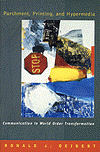|
|
|
|
|
|
|
|
by Ronald Deibert

Throughout history, modes of communications have defined and empowered societies. They have enabled the proliferation of ideologies and political alliances since the time of the development of writing in Sumeria to the invention of movable type, which transformed the medieval world order into the modern one. Today, we are faced with another such transformation: how will the new communication technologies shape today's world order? Interweaving media theory and historical analysis, Parchment, Printing, and Hypermedia: Communication in World Order Transformation explores the effect new digital-telecommunication technologies, which the author calls hypermedia, will have on the distribution of political power in the next century.
Part one tracks the transformation of Europe from medieval to the modern, exploring how particular modes of communication favored the political interests of certain social groups. Just as parchment, for instance, sustained the strategic needs of the papal-monastic world order, the printing press gave rise to the modern system of sovereign nation-states. In [art two, Deibert turns to the hypermedia age, where new digital technologies such as the Internet, encryption, and the high-resolution satellite imaging favor nonterritorial institutions and communities, shifting political authority and policymaking from individual nations to transnational corporations, global financial markets, and nongovernmental organizations and activists.
"This book breaks from the self-imposed narrowness of much recent international relations scholarship. It is very well researched and draws from a wide range of relevant historical and theoretical materials."
--Daniel Deudney, University of Pennsylvania
"Deibert's inquiry into the links between new communications technologies and transformed world orders is a remarkable, trail-blazing accomplishment. He depicts the links across some six centuries of history and a vast array of modern and postmodern concepts, leaving the reader with a keen sense of both the continuities and changes that have marked the human condition. The book is a 'must' read for anyone eager to probe beneath the surface of world affairs."--James N. Rosenau, The George Washington University
About the author.
Parchment, Printing, and Hypermedia: Communication in World Order Transformation
